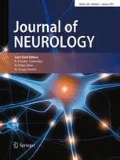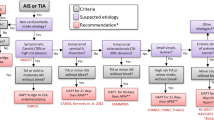Abstract
Aspirin is used in ischemic stroke therapy. However, some patients are not responsive to the antithrombotic action of aspirin. The aim of this study was to assess the prevalence of aspirin resistance in stroke patients and its association with mortality. One-hundred and six patients (mean age 64.9 ± 14.6 years, 53 male) with acute ischemic stroke were consecutively recruited. All subjects were taking aspirin regularly. Aspirin responsiveness was determined by Ultegra Rapid Platelet Function Assay-ASA (VerifyNow Aspirin). Aspirin resistance was defined as aspirin reaction unit (ARU) ≥ 550. Aspirin resistance was detected in 35 patients. There were not any significant differences in age, gender and comorbidities between aspirin-resistant and aspirin-sensitive patients. The mean National Institute of Health Stroke Scale (NIHSS) scores of the aspirin-resistant and aspirin-sensitive patients were 15 ± 3 and 12 ± 5, respectively (p = 0.006). Twenty-seven patients had a history of prior ischemic stroke and eight of them had aspirin resistance. Eleven patients died in-hospital and a total of 43 patients died during 2 years. Both the in-hospital and 2-year mortality rates were significantly higher in patients with aspirin resistance (20 vs. 5.6%, p = 0.038 and 60.0 vs. 31.0%, p = 0.004, respectively). Regression analysis revealed aspirin resistance [odds ratio (OR) 3.097, 95% confidence interval (CI) 1.070–8.959, p = 0.037] as an independent predictor of 2-year mortality, as well as age (OR 1.051, 95% CI 1.003–1.102, p = 0.038) and NIHSS scores (OR 1.208, 95% CI 1.016–1.437, p = 0.033). Aspirin resistance is not uncommon in patients with acute ischemic stroke and is associated with short and long term mortality in these patients.
Similar content being viewed by others
References
Feigin VL (2005) Stroke epidemiology in the developing world. Lancet 365:2160–2161
Donnan GA, Fisher M, Macleod M, Davis SM (2008) Stroke. Lancet 371:1612–1623
Bogousslavsky J, Van Melle G, Regli F (1988) The Lausanne Stroke Registry: analysis of 1,000 consecutive patients with first stroke. Stroke 19:1083–1092
Yip HK, Liou CW, Chang HW, Lan MY, Liu JS, Chen MC (2005) Link between platelet activity and outcomes after an ischemic stroke. Cerebrovasc Dis 20:120–128
Antithrombotic Trialists’ Collaboration (2002) Collaborative meta-analysis of randomised trials of antiplatelet therapy for prevention of death, myocardial infarction, and stroke in high risk patients. BMJ 324:71–86
Ridker PM, Manson JE, Buring JE, Goldhaber SZ, Hennekens CH (1991) The effect of chronic platelet inhibition with low-dose aspirin on atherosclerotic progression and acute thrombosis: clinical evidence from the Physicians’ Health Study. Am Heart J 122:1588–1592
ISIS-2 (Second International Study of Infarct Survival) Collaborative Group (1988) Randomised trial of intravenous streptokinase, oral aspirin, both, or neither among 17,187 cases of suspected acute myocardial infarction: ISIS-2. Lancet 2:349–360
Zimmermann N, Wenk A, Kim U, Kienzle P, Weber AA, Gams E, Schrör K, Hohlfeld T (2003) Functional and biochemical evaluation of platelet aspirin resistance after coronary artery bypass surgery. Circulation 108:542–547
Borna C, Lazarowski E, van Heusden C, Ohlin H, Erlinge D (2005) Resistance to aspirin is increased by ST-elevation myocardial infarction and correlates with adenosine diphosphate levels. Thromb J 3:10
Kahraman G, Sahin T, Kilic T, Baytugan NZ, Agacdiken A, Ural E, Ural D, Komsuoglu B (2007) The frequency of aspirin resistance and its risk factors in patients with metabolic syndrome. Int J Cardiol 115:391–396
Watala C, Pluta J, Golanski J, Rozalski M, Czyz M, Trojanowski Z, Drzewoski J (2005) Increased protein glycation in diabetes mellitus is associated with decreased aspirin-mediated protein acetylation and reduced sensitivity of blood platelets to aspirin. J Mol Med 83:148–158
Anfossi G, Russo I, Trovati M (2008) Resistance to aspirin and thienopyridines in diabetes mellitus and metabolic syndrome. Curr Vasc Pharmacol 6:313–328
Fateh-Moghadam S, Plöckinger U, Cabeza N, Htun P, Reuter T, Ersel S, Gawaz M, Dietz R, Bocksch W (2005) Prevalence of aspirin resistance in patients with type 2 diabetes. Acta Diabetol 42:99–103
Gorog DA, Sweeny JM, Fuster V (2009) Antiplatelet drug ‘resistance’. Part 2: laboratory resistance to antiplatelet drugs-fact or artifact? Nat Rev Cardiol 6:365–373
Eikelboom JW, Emery J, Hankey GJ (2010) The use of platelet function assays may help to determine appropriate antiplatelet treatment options in a patient with recurrent stroke on baby aspirin: against. Stroke 41:2398–2399
Lev EI (2009) Aspirin resistance transient laboratory finding or important clinical entity? J Am Coll Cardiol 53:678–680
Bennett D, Yan B, Macgregor L, Eccleston D, Davis SM (2008) A pilot study of resistance to aspirin in stroke patients. J Clin Neurosci 15:1204–1209
Hohlfeld T, Weber AA, Junghans U, Schumacher M, Boucher M, Schrör K, Siebler M (2007) Variable platelet response to aspirin in patients with ischemic stroke. Cerebrovasc Dis 24:43–50
Berrouschot J, Schwetlick B, von Twickel G, Fischer C, Uhlemann H, Siegemund T, Siegemund A, Roessler A (2006) Aspirin resistance in secondary stroke prevention. Acta Neurol Scand 113:31–35
Chen WH, Lee PY, Ng W, Tse HF, Lau CP (2004) Aspirin resistance is associated with a high incidence of myonecrosis after non-urgent percutaneous coronary intervention despite clopidogrel pretreatment. J Am Coll Cardiol 43:1122–1126
Coleman JL, Wang JC, Simon DI (2004) Determination of ındividual response to aspirin therapy using the Accumetrics Ultegra RPFA-ASA System. Point of Care: J Near-Patient Test Technol 3:77–82
Algra A, van Gijn J (1996) Aspirin at any dose above 30 mg offers only modest protection after cerebral ischaemia. J Neurol Neurosurg Psychiatry 60:197–199
Lee SJ, Kim TH, Kim JG, Lee BR, Chun JU, Oh GS, Lee J (2007) The prevalence of aspirin resistance and related factors in patients with ischemic stroke using the Rapid Platelet Function Assay. Stroke 38:524 (abstract)
Grundmann K, Jaschonek K, Kleine B, Dichgans J, Topka H (2003) Aspirin non-responder status in patients with recurrent cerebral ischemic attacks. J Neurol 250:63–66
Harrison P, Segal H, Blasbery K, Furtado C, Silver L, Rothwell PM (2005) Screening for aspirin responsiveness after transient ischemic attack and stroke: comparison of 2 point-of-care platelet function tests with optical aggregometry. Stroke 36:1001–1005
Boncoraglio GB, Bodini A, Brambilla C, Corsini E, Carriero MR, Parati EA (2009) Aspirin resistance determined with PFA-100 does not predict new thrombotic events in patients with stable ischemic cerebrovascular disease. Clin Neurol Neurosurg 111:270–273
Karepov V, Tolpina G, Kuliczkowski W, Serebruany V (2008) Plasma triglycerides as predictors of platelet responsiveness to aspirin in patients after first ischemic stroke. Cerebrovasc Dis 26:272–276
Jeon SB, Song HS, Kim BJ, Kim HJ, Kang DW, Kim JS, Kwon SU (2010) Biochemical aspirin resistance and recurrent lesions in patients with acute ischemic stroke. Eur Neurol 64:51–57
Englyst NA, Horsfield G, Kwan J, Byrne CD (2008) Aspirin resistance is more common in lacunar strokes than embolic strokes and is related to stroke severity. J Cereb Blood Flow Metab 28:1196–1203
Gum PA, Kottke-Marchant K, Welsh PA, White J, Topol EJ (2003) A prospective, blinded determination of the natural history of aspirin resistance among stable patients with cardiovascular disease. J Am Coll Cardiol 41:961–965
Eikelboom JW, Hirsh J, Weitz JI, Johnston M, Yi Q, Yusuf S (2002) Aspirin-resistant thromboxane biosynthesis and the risk of myocardial infarction, stroke, or cardiovascular death in patients at high risk for cardiovascular events. Circulation 105:1650–1655
Mueller MR, Salat A, Stangl P, Murabito M, Pulaki S, Boehm D, Koppensteiner R, Ergun E, Mittlboeck M, Schreiner W, Losert U, Wolner E (1997) Variable platelet response to low-dose ASA and the risk of limb deterioration in patients submitted to peripheral arterial angioplasty. Thromb Haemost 78:1003–1007
Wang JC, Aucoin-Barry D, Manuelian D, Monbouquette R, Reisman M, Gray W, Block PC, Block EH, Ladenheim M, Simon DI (2003) Incidence of aspirin nonresponsiveness using the Ultegra Rapid Platelet Function Assay-ASA. Am J Cardiol 92:1492–1494
Grotemeyer KH, Scharafinski HW, Husstedt IW (1993) Two-year follow-up of aspirin responder and aspirin non responder. A pilot-study including 180 post-stroke patients. Thromb Res 71:397–403
Adams RJ, Albers G, Alberts MJ, Benavente O, Furie K, Goldstein LB, Gorelick P, Halperin J, Harbaugh R, Johnston SC, Katzan I, Kelly-Hayes M, Kenton EJ, Marks M, Sacco RL, Schwamm LH, American Heart Association, American Stroke Association (2008) Update to the AHA/ASA recommendations for the prevention of stroke in patients with stroke and transient ischemic attack. Stroke 39:1647–1652
Krasopoulos G, Brister SJ, Beattie WS, Buchanan MR (2008) Aspirin “resistance” and risk of cardiovascular morbidity: systematic review and meta-analysis. BMJ 336:195–198
Zytkiewicz M, Giełwanowska L, Wojtasińska E, Psuja P, Zawilska K (2008) Resistance to acetylsalicylic acid in patients after ischemic stroke. Pol Arch Med Wewn 118:727–733
Geisler T, Gawaz M (2008) Resistance to antiplatelet substances—a real clinical problem. Herz 33:260–268
Hankey GJ, Eikelboom JW (2004) Aspirin resistance. BMJ 328:477–479
Peters RJ, Mehta SR, Fox KA, Zhao F, Lewis BS, Kopecky SL, Diaz R, Commerford PJ, Valentin V, Yusuf S, Clopidogrel in Unstable angina to prevent Recurrent Events (CURE) Trial Investigators (2003) Effects of aspirin dose when used alone or in combination with clopidogrel in patients with acute coronary syndromes: observations from the Clopidogrel in Unstable angina to prevent Recurrent Events (CURE) study. Circulation 108:1682–1687
Bhatt DL, Fox KA, Hacke W, Berger PB, Black HR, Boden WE, Cacoub P, Cohen EA, Creager MA, Easton JD, Flather MD, Haffner SM, Hamm CW, Hankey GJ, Johnston SC, Mak KH, Mas JL, Montalescot G, Pearson TA, Steg PG, Steinhubl SR, Weber MA, Brennan DM, Fabry-Ribaudo L, Booth J, Topol EJ, CHARISMA Investigators (2006) Clopidogrel and aspirin versus aspirin alone for the prevention of atherothrombotic events. N Engl J Med 354:1706–1717
Diener HC, Bogousslavsky J, Brass LM, Cimminiello C, Csiba L, Kaste M, Leys D, Matias-Guiu J, Rupprecht HJ, MATCH investigators (2004) Aspirin and clopidogrel compared with clopidogrel alone after recent ischaemic stroke or transient ischaemic attack in high-risk patients (MATCH): randomised, double-blind, placebo-controlled trial. Lancet 364:331–337
Lee JH, Cha JK, Lee SJ, Ha SW, Kwon SU (2010) Addition of cilostazol reduces biological aspirin resistance in aspirin users with ischaemic stroke: a double-blind randomized clinical trial. Eur J Neurol 17:434–442
McCabe DJ, Harrison P, Mackie IJ, Sidhu PS, Lawrie AS, Purdy G, Machin SJ, Brown MM (2005) Assessment of the antiplatelet effects of low to medium dose aspirin in the early and late phases after ischaemic stroke and TIA. Platelets 16:269–280
Harrison P, Segal H, Silver L, Syed A, Cuthbertson FC, Rothwell PM (2008) Lack of reproducibility of assessment of aspirin responsiveness by optical aggregometry and two platelet function tests. Platelets 19:119–124
Acknowledgments
This study is supported by both Marmara University and Akdeniz University Research Funds.
Conflict of interest
None.
Author information
Authors and Affiliations
Corresponding author
Rights and permissions
About this article
Cite this article
Ozben, S., Ozben, B., Tanrikulu, A.M. et al. Aspirin resistance in patients with acute ischemic stroke. J Neurol 258, 1979–1986 (2011). https://doi.org/10.1007/s00415-011-6052-7
Received:
Revised:
Accepted:
Published:
Issue Date:
DOI: https://doi.org/10.1007/s00415-011-6052-7



